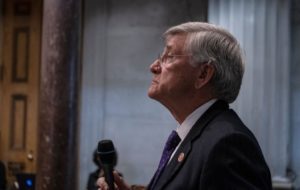
Sen. Todd Gardenhire, R-Chattanooga, is sponsoring a bill to expand the use of charter school funds in Hamilton County. (Photo: John Partipilo)
This article is from Tennessee/Lookout.
Legislation expanding the state’s education savings account program to Hamilton County Schools passed the Senate Education Committee Wednesday with only token opposition.
Despite a contentious vote in 2019 that brought the House to a standstill and led to an FBI investigation, the measure to spread private school vouchers to Hamilton passed on a 6-2 vote with one abstention and no ruckus. It moves next to the Senate floor.
“This is just one more arrow in the quiver for students to get an education, if they so desire, and they’re not trapped in a failing school,” state Sen. Todd Gardenhire, sponsor of SB12, said afterward.
The education savings account took effect in Metro Nashville and Shelby County public schools this year after the Supreme Court overruled two lower courts and found it constitutional. So far, 643 students in those two districts have received about $8,000 each in public funds to enroll in private schools.
The Chattanooga Republican said he believes it’s also necessary in his district because the school system failed to make improvements through a local advisory board and despite an injection of more than $20 million in state funding to bolster problem schools. The district had five failing schools in 2016, and after the advisory board took over, the number increased to nine, according to Gardenhire.
“That’s not success,” Gardenhire added.
Gardenhire previously predicted the “education industrial complex will have a conniption,” and he continued to support the concept Wednesday, saying the school district would lose only a small amount of money but that students who want to transfer to private schools would benefit.
Senate Minority Leader Raumesh Akbari of Memphis and Sen. Joey Hensley, R-Hohenwald, voted against the measure Wednesday with Republican Sen. Rusty Crowe of Johnson City abstaining.
“Our pilot program has already been put in place. I don’t think there’s been enough time to even see if it will be successful,” said Akbari, who also opposed the program’s establishment in Davidson and Shelby counties.
Gov. Bill Lee made vouchers one of his early priorities but barely pushed it through the House in April 2019. During a tie vote, then-House Speaker Glen Casada held the board open for nearly 45 minutes and worked the chamber for a tie-breaker. Ultimately, Republican Rep. Jason Zachary of Knoxville agreed to vote for the bill as long as Knox County Schools were dropped as a voucher district.
Rep. Patsy Hazlewood declined to vote for the bill as long as Hamilton County Schools were made a voucher district in 2019. But she is co-sponsoring the House version of the Hamilton County bill with House Education Administration Committee Chairman Mark White, R-East Memphis, a proponent of “school choice” who carried the initial bill for Gov. Lee.
Hazlewood, a Signal Mountain Republican who chairs the House finance committee, said Wednesday she hasn’t started focusing on the bill this session.
The ESA program allows for up to 5,000 students to participate in its first year with 5,000 more to follow annually in a five-year experiment.
The state hasn’t come close to that number yet.
The Department of Education had received 1,273 applications by Monday, 747 from Memphis-Shelby County, 467 from Metro Nashville and 59 from others. So far, 643 applications have been approved and 570 deemed ineligible, according to the department.
While the Hamilton County bill could see smooth sailing in the Senate, it might not receive the same reception in the House where rural lawmakers are likely worried that it will eventually come to their counties and take critical education funding from one of their biggest employers.
Yet state Rep. Bryan Richey, R-Maryville, is sponsoring legislation that would allow vouchers to be offered to every student in all school districts statewide, not just those that have struggling schools. Richey’s bill also would allow homeschool students to receive ESA funds.
House Democratic Caucus Chairman John Ray Clemmons contends that voucher supporters in the Legislature are taking their “marching orders from out-of-state extremist organizations” rather than Tennessee families.
Clemmons, a Nashville Democrat, said constituents “would find it unsettling to know that their representatives are prioritizing such controversial legislation that literally steals money from our already underfunded public schools and enriches private entities.”
School choice groups such as Tennesseans for Student Success raised $750,000 for Team Kid PAC last year while Tennesseans for Putting Students First received $466,700 in donations and the state chapter of American Federation for Children picked up $360,825, according to a Tennessee Journal report. The Tennessee Education Association is among of the state’s top fundraisers and donors too.
Gov. Lee continued to tout the ESA program in his State of the State address Monday night, highlighting the experience of a Nashville girl who received voucher funds to enroll in a private Catholic school where she improved her reading skills and started participating in extracurricular activities.
Allegations of bribery followed the 2019 House vote, and the FBI began investigating to determine whether any illegal offers took place. No charges have been filed in connection with the vote.
Studies put together in 2020, according to a Chalkbeat report, showed that voucher programs in Indiana, Louisiana, Ohio and Washington, D.C., wound up hurting student achievement and leading to “moderate to large declines.”
_ Sam Stockard
